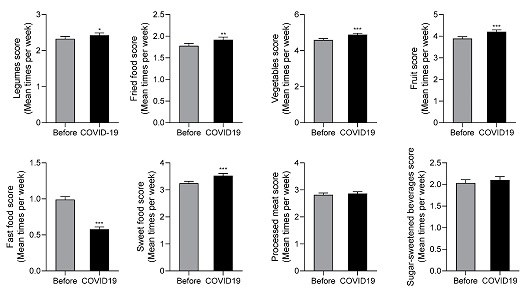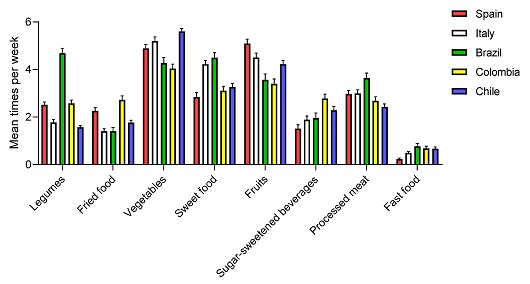Covid-19: Study shows changes in teenagers’ eating habits
03/12/2020
Informe Ensp
A study published in the Nutrients scientific journal shows that teenagers of five countries, including Brazil, have changed their consumption of fried foods, sweet foods, fruits, and vegetables during the social isolation prescribed to reduce Covid-19 transmission. The research, which reveals an increased consumption of fruits and vegetables during social distancing, has also shown higher ingestion of sweets and fried foods among teenagers. With the participation of Letícia Cardoso, researcher of the National School of Public Health (Ensp/Fiocruz), and Patricia Padilha, professor of the Federal University of Rio de Janeiro (UFRJ), the study provides the first description of how the Covid-19 pandemic has altered diet trends among teenagers in Spain, Italy, Brazil, Colombia, and Chile. The initiative was led by Alberto Davalos, of the Madrid Institute of Advanced Food Studies.
The isolation during the pandemic has affected diet, especially that of teenagers, who are highly susceptible to acquiring poor eating habits. Titled Covid-19 Confinement and Changes of Adolescent’s Dietary Trends in Italy, Spain, Chile, Colombia and Brazil, the article shows the results of the study that described dietary changes during confinement among adolescents from 10 to 19 years old and identifies the factors that may have led to these changes.
The research shows that 43% of the teenagers ate vegetables every day during confinement, compared to 35.2% who consumed them before. Likewise, only 25.5% of the teenagers under study consumed at least one piece of fruit per day before the pandemic, against 33.2% during confinement. “These results are not surprising, as sales of this type of food have increased since the beginning of the quarantine, and people have more time to cook at home”, the study authors explain.

The survey shows that fast food ingestion has fallen drastically among teenagers during confinement. While only 44.6% of teenagers used to consume this kind of food at least once a week, the percentage increased to 64% during confinement.
On the other hand, the average consumption of fried foods and sweets has increased significantly during the confinement required to contain Covid-19 transmission. While 14% of teenagers used to consume sweet foods on a daily basis before the pandemic, during confinement this percentage has risen to 20.7%.
As for consumption of fried foods from 4 to 7 days a week, there has been an increase from 7.4% (4 days), 3.7% (5 days), 1.8% (6 days), and 2.1% (7 days a week) before the pandemic to 8.8%, 3.8%, 2.2%, and 2.9% during confinement, respectively. “These results have confirmed previous studies that suggested that confinement may lead to irregular eating patterns and frequent snacking by teenagers due to boredom and stress. It is important to highlight that these dietary habits are associated with higher calorie intake and a higher risk of obesity and other chronic diseases in the future, such as diabetes, cardiovascular conditions, and others”, explains Leticia Cardoso, of Ensp/Fiocruz.
The data were collected by means of an anonymous questionnaire on the consumption of foods, distributed to 820 teenagers in Spain, Italy, Brazil, Colombia, and Chile.
Brazil
Brazilian teenagers stand out for their higher average consumption of vegetables than young people of other countries during the same period (5 servings per week). In all these countries, except Spain, this increase was significant during the pandemic. “Brazil is already one of the countries with the best intake of fruits and vegetables and lowest consumption of ultra-processed foods among teenagers (26% in 2018), when compared to high-income countries (66%) and to Chile (29%), a Latin American country included in the survey and of which we have recent data”, commented the researcher.

It is important to generate large-scale future studies that analyze dietary habits to encourage healthy food habits among teenagers, especially after this confinement period. “Understanding dietary habits of teenagers during isolation due to the Covid-19 pandemic will help public health authorities to remodel future strategies for nutritional recommendations, in preparation for future pandemics”, the article states.


